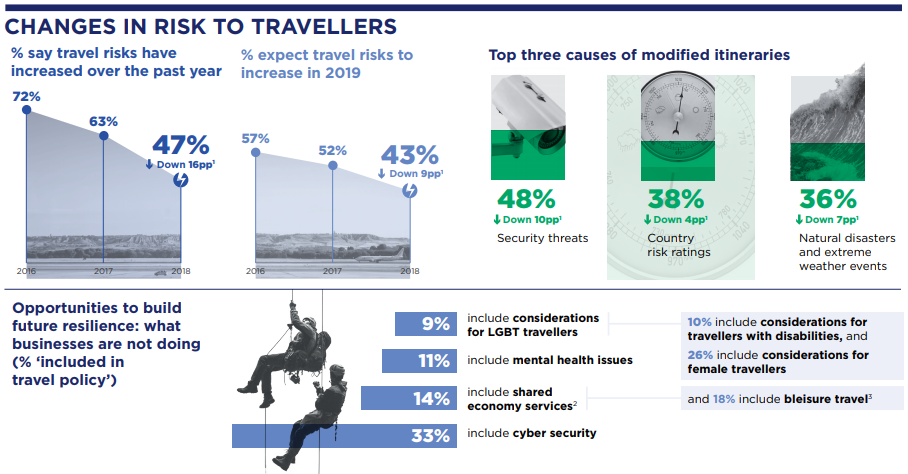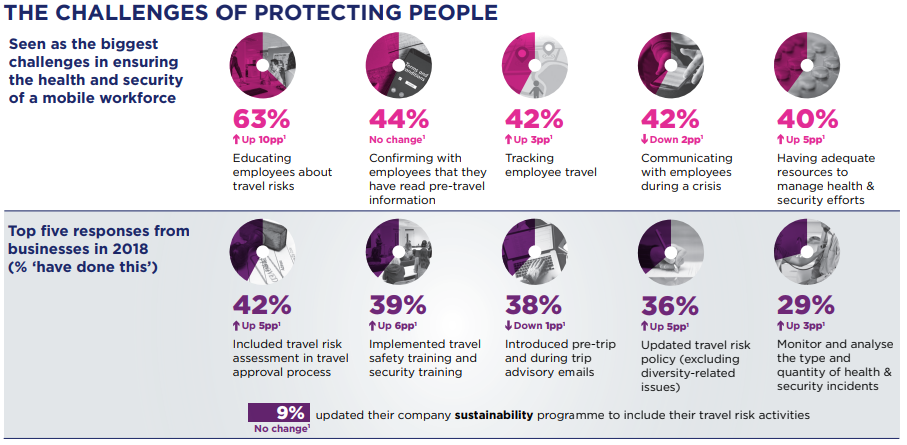Summary:
- Almost half of decision makers believe that travel risks have grown this year and will increase again next year, according to new research;
- The Ipsos MORI 'Business Resilience Trends Watch 2019' survey shows that organisations are struggling to keep up with modern workforce needs;
- International SOS and Control Risks, two of the world's leading risk specialists have produced an updated Travel Risk Map for 2019.
The findings, based on the Ipsos MORI 'Business Resilience Trends Watch 2019' Oct-2018 survey of 640 people who organise, influence, or are responsible for, their organisation's travel and risk mitigation policies, shows 47% of respondents stating travel risks have increased over the past year. A notable rise, but a drop of 16 percentage points from last year (63%), which itself was down from 72% the previous year.
A slightly smaller volume (45%) say that risks have stayed the same over 2018, an increase of 14 pp from last year (31%) and up from 24% in 2016. Meanwhile, 43% expect travel risks to increase in 2019. Down from 52% predicting risk increase in 2018 and 57% in 2017.
The survey shows that organisations are struggling to keep up with modern workforce needs. "Our research reveals that the evolving travel habits of the modern workforce are being overlooked by many organisations," says Sally Napper, Security Specialist at International SOS and Control Risks.
While employees' demands and expectations are constantly evolving, the survey finds that travel policies are not keeping up with the changing needs of a modern workforce. Only a third (33%) of organisations cover cyber security in their travel policy, just over a quarter (26%) cover considerations for female travellers, 18% cover bleisure travel and 14% shared economy services.
Similarly, considerations for travellers with disabilities or mental health issues are covered by 10% and 11% of travel policies respectively, while considerations for LGBTQ travellers are covered by just 9% of travel policies.
"Assessment of travel health and safety must look at the individual. It's not just about the destination," explains Dr Doug Quarry, group medical director, information and analysis, at International SOS. He explains, the personal profile of the traveller, including gender, age, sexual orientation, and mental health status, can change the risks they will face. "Businesses that focus on ensuring their travel policies reflect a modern workforce will better meet their Duty of Care and sustainability," he adds.
As in the previous 'Business Resilience Trends Watch' research, educating employees about travel risks (63%) has remained the greatest challenge for ensuring the safety of travellers and has become an increasing issue, up by 10 percentage points. This is followed by confirming with employees that they have read pre-travel information (44%), tracking employee travel (42%), communicating with employees during a crisis (42%) and having adequate resources to manage health and security efforts (40%).
Including a travel risk assessment in the travel approval process is the most common response to health and security concerns over the past year, selected by 42% of respondents. The next most popular responses include implemented travel safety training and security training (39%), introducing pre-trip and during trip advisory emails (38%) and updated travel risk policy (excluding diversity related issues) (36%).
However, alongside not covering key points like mental health and diversity issues in their travel policy, there are other things that few businesses are currently doing, according to the findings. Only 9% updated their company sustainability programme to include their travel risk programme, only 11% monitored the number of road traffic accidents and only 21% implemented a programme for people to understand their existing health issues while away on business.
The latest edition of the Travel Risk Map from International SOS and Control Risks, updated for 2019, reveals the latest medical and security risk ratings of destinations worldwide. It provides a comprehensive overview of medical, security and road safety risks by destination, to help organisations and their mobile workforce in their travel risk mitigation efforts.

